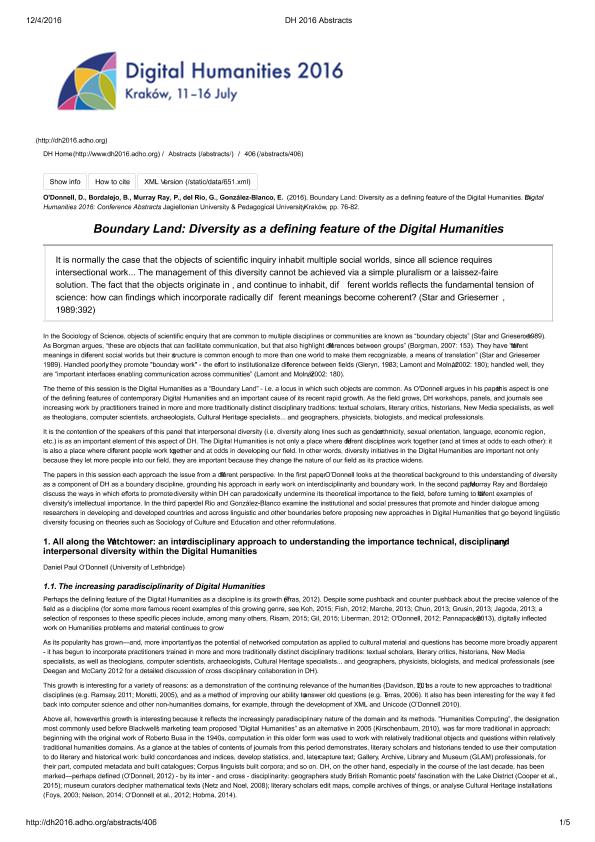Mostrar el registro sencillo del ítem
dc.contributor.author
del Rio, María Gimena

dc.contributor.author
Elena González Blanco García
dc.contributor.author
O'Donnell, Daniel
dc.date.available
2024-03-07T14:22:11Z
dc.date.issued
2016
dc.identifier.citation
Boundary land: diversity as a defining feature of the Digital Humanities; Digital Humanities 2016: Conference; Cracovia; Polonia; 2016; 1-5
dc.identifier.isbn
978–83–942760–3–4
dc.identifier.uri
http://hdl.handle.net/11336/229727
dc.description.abstract
he theme of this session is the Digital Humanities as a ?Boundary Land? - i.e. a locus in which such objects are common. As O´Donnell argues in his paper, this aspect is one of the defining features of contemporary Digital Humanities and an important cause of its recent rapid growth. As the field grows, DH workshops, panels, and journals see increasing work by practitioners trained in more and more traditionally distinct disciplinary traditions: textual scholars, literary critics, historians, New Media specialists, as well as theologians, computer scientists, archaeologists, Cultural Heritage specialists... and geographers, physicists, biologists, and medical professionals.It is the contention of the speakers of this panel that interpersonal diversity (i.e. diversity along lines such as gender, ethnicity, sexual orientation, language, economic region, etc.) is as an important element of this aspect of DH. The Digital Humanities is not only a place where different disciplines work together (and at times at odds to each other): it is also a place where different people work together and at odds in developing our field. In other words, diversity initiatives in the Digital Humanities are important not only because they let more people into our field, they are important because they change the nature of our field as its practice widens.The papers in this session each approach the issue from a different perspective. In the first paper, O?Donnell looks at the theoretical background to this understanding of diversity as a component of DH as a boundary discipline, grounding his approach in early work on interdisciplinarity and boundary work. In the second paper, Murray Ray and Bordalejo discuss the ways in which efforts to promote diversity within DH can paradoxically undermine its theoretical importance to the field, before turning to different examples of diversity´s intellectual importance. In the third paper, del Rio and González-Blanco examine the institutional and social pressures that promote and hinder dialogue among researchers in developing and developed countries and across linguistic and other boundaries before proposing new approaches in Digital Humanities that go beyond lingüistic diversity focusing on theories such as Sociology of Culture and Education and other reformulations.
dc.format
application/pdf
dc.language.iso
eng
dc.publisher
Jagiellonian University; Pedagogical University
dc.rights
info:eu-repo/semantics/openAccess
dc.rights.uri
https://creativecommons.org/licenses/by-nc-sa/2.5/ar/
dc.subject
DIGITAL HUMANITIES
dc.subject
SCIENTIFIC FIELD
dc.subject
DISCIPLINES
dc.subject
ACADEMIA
dc.subject.classification
Otras Lengua y Literatura

dc.subject.classification
Lengua y Literatura

dc.subject.classification
HUMANIDADES

dc.title
Boundary land: diversity as a defining feature of the Digital Humanities
dc.type
info:eu-repo/semantics/publishedVersion
dc.type
info:eu-repo/semantics/conferenceObject
dc.type
info:ar-repo/semantics/documento de conferencia
dc.date.updated
2022-12-12T23:45:58Z
dc.journal.pagination
1-5
dc.journal.pais
Polonia

dc.journal.ciudad
Kraków
dc.description.fil
Fil: del Rio, María Gimena. Consejo Nacional de Investigaciones Científicas y Técnicas. Oficina de Coordinación Administrativa Saavedra 15. Instituto de Investigaciones Bibliográficas y Crítica Textual. IIBICRIT - Subsede "Seminario Orduna"; Argentina
dc.description.fil
Fil: Elena González Blanco García. Universidad Nacional de Educación a Distancia; España
dc.description.fil
Fil: O'Donnell, Daniel. University of Lethbridge; Canadá
dc.relation.alternativeid
info:eu-repo/semantics/altIdentifier/url/http://dh2016.adho.org/abstracts/406
dc.conicet.rol
Autor

dc.conicet.rol
Autor

dc.conicet.rol
Autor

dc.conicet.rol
Autor

dc.coverage
Internacional
dc.type.subtype
Congreso
dc.description.nombreEvento
Digital Humanities 2016: Conference
dc.date.evento
2016-07
dc.description.ciudadEvento
Cracovia
dc.description.paisEvento
Polonia

dc.type.publicacion
Book
dc.description.institucionOrganizadora
Jagiellonian University
dc.description.institucionOrganizadora
Pedagogical University
dc.source.libro
Digital Humanities 2016: Conference Abstracts
dc.date.eventoHasta
2016-07
dc.type
Congreso
Archivos asociados
